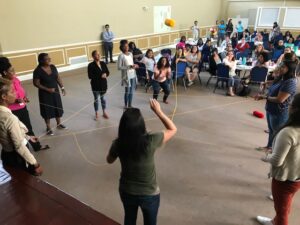 Joseph E. Colford, Ph.D., ChildWIN Board Member –
Joseph E. Colford, Ph.D., ChildWIN Board Member –
Resilience comes from the Latin word “resilere.” It means “to spring back” or “to recover from misfortune.” Those children who are more resilient than others tend to be able to tolerate more effectively the everyday stressors and strains that many of them encounter each day. Research also tells us that resilient children are less likely to be depressed and helpless, more likely to be able to problem-solve with a variety of solutions to their challenges, and better able to deal with disappointment and failure experiences.
Why are some children more resilient than others? Well, genetics does play a role, albeit not a very large one, in how resilient children are. Yet there also are some components of resilience that parents can foster in their children. Two such resilience ingredients come to mind: social connectedness and optimism.
One of the things that strengthens children in times of stress is social connectedness, the level of social support they experience. Research tells us that most victims of trauma are able to recover on their own, as long as they sense that they are supported by a loving parent or caregiver, by a close circle of friends, or by some kind of mentor (teacher, coach, clergy, other family member). In fact, years of research reveal that a strong parent/child bond is probably the strongest predictor of how resilient children are. The quality of that bond, established even within the first few months of birth, goes a long way to assist the development of resilience in children long into adulthood. Enhancing that bond is critical for every parent.
When a reporter asked the clinical psychologist assigned to debriefing the rescue workers at Ground Zero after the 9/11 attacks how she dealt with all the tragic stories she heard each day, she replied simply, “I call my mom.” She went on to explain that all of her tough days ended with a call to her mother.
Resilience also is enhanced by a spiritual connection to a higher power, something religious or spiritual. A woman told the story of how she had been traumatized as an 18-year-old after having been involved in a car accident, even though she had not been seriously injured. She didn’t leave her home for a full year after the incident. When asked what it was that enabled her to finally leave it, she said, “I went to church, because when you are in church, there is nothing to fear.” And so she recovered and went on with her life.
Optimism involves the way people think, specifically about the causes of both positive and negative events in their lives. Psychologists refer to one’s tendency to do so on a regular basis as an “explanatory style,” the manner in which people either take responsibility for their own successes and failures or assign the causes to some other external factor having to do with such events. For example, when something happens in a child’s life, they tend to come up with an explanation as to how and why it happened. They answer their own questions like, “Was it something I did that made it happen, or was it something that was beyond my control and not my fault”? Of course, their answers to questions such as these can lead to either positive or negative emotions: self-blame and sadness (“It was my fault.”) or self-affirmation and pride (“I worked hard on that project.”)
Typical explanations children come up with have to do with ability or effort. Parents can play a role in helping their children change the focus of their “explanatory style” when they hear self-defeating, pessimistic talk coming from their mouths.
In other words, parents can help their children practice flexible thinking: the ability to come up with multiple explanations of the causes of the challenges they might encounter. When a child’s explanation for a failing grade on a math test is due to ability (“I am just dumb!”), it may be time for parents to help them change the way they think about the failure and come up with other explanations:
- Did they put sufficient effort into studying for a test that they knew would be challenging?
- Did they know that math did not come easy to them as other academic subjects did, thus the need to hunker down more in that subject?
- Did they think that this grade was not a catastrophe, but just a temporary setback that may not be repeated the next time around?
Taking the emphasis off the ability explanation in favor of one based on effort accomplishes two things: first, it gives children more control over the outcome (“Maybe I didn’t put in enough effort to study for the test.”) After all, they can’t control ability, but they can control the effort they expend. Second, it gives children the hope (optimism) that the next time around things may be different, since they can control the outcome with greater effort and focus.
Parents could also help their children by:
- Praising effort rather than the end result of a project (“You really worked so hard on this.” Rather than “You are so good at this.”)
- Reviewing the explanation of an unfortunate event (“Did he really bump into you on purpose, or was the school corridor really crowded so that there was a lot of accidental bumping going on”?)
- Helping them cope with disappointment (“Was I cut from the softball team because I am just a loser? Or should I have practiced more before the tryouts”?)
Understanding the explanatory style of their children may be a better way for parents to be able to intercede in their lives and help them be more optimistic and hopeful for the future.




